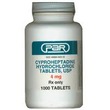Pronunciation
si-proe-HEP-ta-deen - Pronunciation guide
Brand Names
- Periactin
Description
 Cyproheptadine is an antihistamine that has anti-serotonin properties and is used in the treatment of conditions involving the pituitary gland, such as pituitary pars intermedia dysfunction and pituitary adenomas, or head shaking, especially in older horses.
Cyproheptadine is an antihistamine that has anti-serotonin properties and is used in the treatment of conditions involving the pituitary gland, such as pituitary pars intermedia dysfunction and pituitary adenomas, or head shaking, especially in older horses.
Usage
Cyproheptadine is used when the pituitary gland becomes enlarged or hypertrophy of the pituitary gland develops. Clinical signs in horses are similar to Cushing's disease in humans. This is a fairly common problem in older horses and ponies. When cyproheptadine is used for the treatment of head shaking, it is usually for its antihistamine properties, especially when an allergic component exists.
Dosage and Administration
 Cyproheptadine Cyproheptadine |
||||
|---|---|---|---|---|
| Method | Dosage (click row for calculator) |
Concentration | Period | Duration |
| Oral | 0.25 mg/kg | 4 mg/tablet 1 | Once or twice daily | NA |
Notes:
|
||||
Side Effects
Common side effects include sedation, dry mucous membranes, and increased heart rate.
Precautions
Cyproheptadine should not be used in horses with inflammatory airway disease.
Cyproheptadine has a wide margin of safety. Although it is not FDA approved for use in horses, it is considered accepted practice. It is a prescription drug and U.S. federal law restricts it to use by or on the lawful written or oral order of a licensed veterinarian.
Cyproheptadine is prohibited or regulated in most sanctioned competitions. A veterinarian and the individual regulatory group should be consulted regarding it's use.
Interactions
Cyproheptadine may have an additive effect when used with other central nervous system depressant drugs.
Overdose
Overdose causes more pronounced symptoms, similar to side effects mentioned above.
Images
 Cyproheptadine Oral Syrup
Cyproheptadine Oral Syrup
 Cyproheptadine Tablets
Cyproheptadine Tablets
Literature
